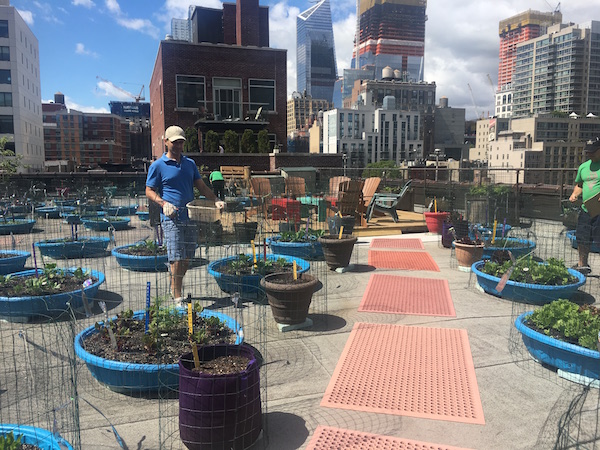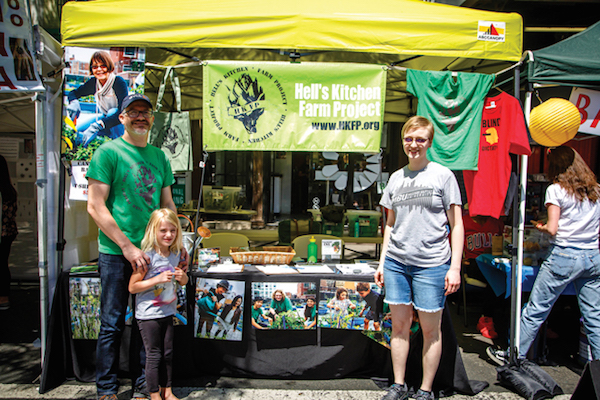
BY REBECCA FIORE | When Jennifer Shotts moved to New York City from Kansas, she knew she wanted to be a part of the community. As a self-professed environmentalist, Shotts was shocked at how much trouble she had finding a community garden.
New York Cares, which guides volunteers to places where they can work to improve education, revitalize public spaces, and meet the immediate needs of those living in poverty, placed her at Metro Baptist Church (410 W. 40th St., btw. Ninth & Dyer Aves.).
At first, she helped out in the food pantry. “Then someone said to me, ‘Have you seen the rooftop?’ I thought, what’s up there? I trekked all the steps and just fell in love with it,” Shotts recalled, of that moment over three years ago.
Four flights of stairs above the food pantry is the Hell’s Kitchen Farm Project (HKFP), a 4,000-square-foot volunteer-run rooftop garden containing 52 kiddie pools, 38 pots, and 20 rail hanging planters tasked with growing fresh, organic fruits, and vegetables.
HKFP was created in 2010 as a response to the rapid gentrification happening in the neighborhood. Clinton Housing Development Company, Metro Baptist Church, Rauschenbusch Metro Ministries, and the Metropolitan Community Church created HKFP as a way to provide fresh produce for all.
“There aren’t a lot of affordable grocery stores in this area and there was a concern that low-income people, especially the food pantry clients who weren’t really able to eat fresh, healthy vegetables,” Debbie Mullens, a third-year volunteer, said.
Lettuce, tomatoes, Swiss chard, kale, collared greens, radishes, scallions, mustard greens, bok choy, apples, blueberries, and raspberries grow in the kiddie pools and pots, while herbs are grown in the rail-hanging planters.
Kiddie pools are used because they are light-weight and don’t put too much pressure on the 20th century building’s structure, Rev. Tiffany Triplett Henkel said. Henkel is a pastor at Metro Baptist Church and executive director of Rauschenbusch Metro Ministries. “We farm from April to about mid-December,” Henkel explained, though they have experimented in the winter months, growing cover crops to keep the soil rich.
Thursdays and Saturdays from 10 a.m. to 1 p.m., the farm is open to the public for gardening. Shovels, trowels, sunscreen, gloves, and clippers are provided.
“Everything that we grow here goes down to the food pantry on the first floor,” Mullens noted. “Everything is donated. None of it is sold and the volunteers don’t take any food home with them.” She said on a good day there can be between 10 to 30 people on the roof. Currently, there are over 20 plants growing, with half a dozen more on the way as the summer months approach.
“In the course of the year we will probably have between two hundred to three hundred people gardening with us,” Mullens said. A regular volunteer could vary from a young adult learning about crops to a retired folk trying a new hobby out, she said. Groups often come up, corporate volunteers such as Morgan Stanley, Zipcar, and Hermes, as well as educational groups from local schools.
“Urban agriculture appeals to a wide variety. We have folks of all walks of life,” Henkel said.
The volunteers harvest the crops, weigh them, and upload their records to Farming Concrete, which is (according to their website) “an open, community-based research project to measure how much food is grown in community gardens and urban farms.” It is supported by the New York City Community Garden Coalition. They provide scales all over the city.
The pantry at Metro Baptist Church, which is open Saturdays at 11 a.m., is described as a client’s choice-style, according to Mullens, where community members can come pick out the foods they prefer.
“As the folks come through they can select what they want, rather than just walking in and somebody handing them a bag of who knows what,” she said, and noted that the food pantry currently has about 750 clients.

Additionally, this will be the farm’s second year with high school interns working on the garden and learning about how to make a difference in their communities. All local high schoolers, experienced with farming or not, are welcome. The Urban Farm Intern Program selected 10 students to work 15-20 hours a week for six weeks from July 5 to Aug. 12. A modest stipend will be given to them.
“Last year, we had eight students for four weeks and this year we will have ten students for six weeks,” Henkel said.
These interns will not only have a hands-on experience to planting and harvesting, but also have classroom time where they will learn from professors of agriculture and other professionals.
“Interns will be learning about urban and non-urban agriculture techniques, how to care for and grow food,” Henkel said. “But more than that even learning about food systems and when they are compromised, nutrition, and how communities can address food needs.”
Also, the farm is gaining its first college intern from Berea College in Kentucky for June and July. Mullens said she is excited for the new interns to come in after the success of last summer.
“I think these kids came away with a much better idea of what food justice is and how you can impact hunger issues through urban agriculture,” she said.
In further addition to the interns, the rooftop, and the pantry, HKFP also has a program in connection with a local farmer. The Community Support Agriculture, or CSA, program provides people living in the neighborhood to purchase fresh and locally grown food from Nolasco Farm in Andover, NJ. There are weekly, and bi-weekly shares.
“The concept of the CSA is you support the farmer upfront. That way the farmer can buy what he needs. It’s a form of supporting local farmers,” Henkel said. A full share for 22 weeks costs $550, while a half share, every other week, is $275. Three hours of volunteer work is required, “that’s the spirit of it,” Henkel said.
People can also sponsor shares that will provide fresh food to other local pantries. “While we are proud of the food we are able to grow and give to the food pantries, getting education around food is more important,” Henkel said. “If we can work with a younger generation then they can learn to advocate for themselves and their community. We are growing more than food.”
For more information, visit hkfp.org, mbcnyc.org, clintonhousing.org, rmmnyc.org, mccchurch.org, farmingconcrete.org, and https://nyccgc.org.


































